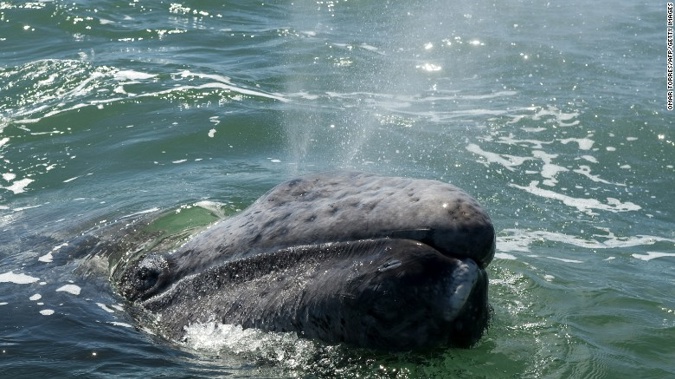
Space weather has more implications than causing glitches in Earth's satellite-based communications -- it can also strand gray whales, according to a new study. Typically, space weather is created when solar storms occur on the sun and stream out toward Earth. The high-energy particles can disrupt our communications and Earth's magnetic field.
But they may also be interfering with whale navigation. Gray whales have one of the longest migrations among mammals, travelling between 10,000 and 12,000 miles each year. They complete a round trip between Mexico's warm waters for mating and the Arctic for feeding. They migrate near the shore throughout their lengthy journey, which makes tracking them -- and their stranding events -- a little easier.
But scientists don't entirely understand how gray whales accomplish this navigational feat. The ocean isn't exactly full of visual cues like it is for those on land. Scientists think right whales migrate based on other senses -- like picking up on Earth's reliable magnetic field.
Previous research determined a relationship between right whale stranding and sunspot activity. Sunspots often occur when solar storms send out a stream of energetic particles from the sun that affects our planet's magnetic field.
Researchers studied 31 years of data on gray whale stranding in an attempt to determine more about how right whales navigate and if their method of navigation causes them to strand. The study used data of 186 live strandings, meaning the whales were alive and showed no signs of illness, injury, human causes and emaciation.
In particular, the researchers analysed the stranding data to see if radio frequency noise or local displacements of the magnetic field increased by solar storms impacted the whales. Their study published Monday in the journal Current Biology.
"I hypothesised that by looking at patterns in the spacing and timing of incidents where an animal was unable to navigate properly, we could better understand the sense as a whole," Granger said.
First, the researchers established that more strandings occurred on days with high solar activity, according to the study. In fact, the rate of stranding more than doubled on those days.
Next, they wanted to determine if it was due to magnetic field shifts or a disruption in the animal's ability to sense the magnetic field. Either way, the whales would receive the wrong navigational information or become disoriented and end up in the wrong spot, leading to stranding.
"Is it that the solar storms are pushing the magnetic field around and giving the whales incorrect information -- for example, the whale thinks it is on 4th Street, but it is actually on 8th?" said Jesse Granger, lead study author at Duke University. "Or is it that the solar storms are messing up the receptor itself -- the whale thinks it is on 4th Street, but has just gone blind?
Solar storms cause an increase in radio frequency noise, and strandings occurred on days that registered that level of noise. But the whales were not affected by the shift of the magnetic field
"We show that the mechanism behind the relationship between solar storms and gray whales, if it has an effect on a magnetic sensor, is likely caused by disruption to the sense itself, not inaccurate information," Granger said. "So, to put this back into the earlier metaphor, the big secondary finding of this paper is that it is possible that the reason the whales are stranding so much more often when there are solar storms is because they have gone blind, rather than that their internal GPS is giving them false information."
The researchers reinforced that this isn't the only cause for stranding -- especially human causes like mid-frequency naval sonar -- and it isn't conclusive evidence for magnetoreceptive sensors in whales. But the research is some of the first evidence that these whales depend on a type of magnetic sense for navigation.
Going forward, Granger and her colleagues want to study other whale species to determine if this is a pattern.
"I really thought that the cause of the strandings was going to be inaccurate information," Granger said. "When those results came up negative, I was flummoxed. It wasn't until one of my co-authors mentioned that solar storms also produce high amounts of radio-frequency noise, and I remembered that radio-frequency noise can disrupt magnetic orientation, that things finally started to click together."
Take your Radio, Podcasts and Music with you









